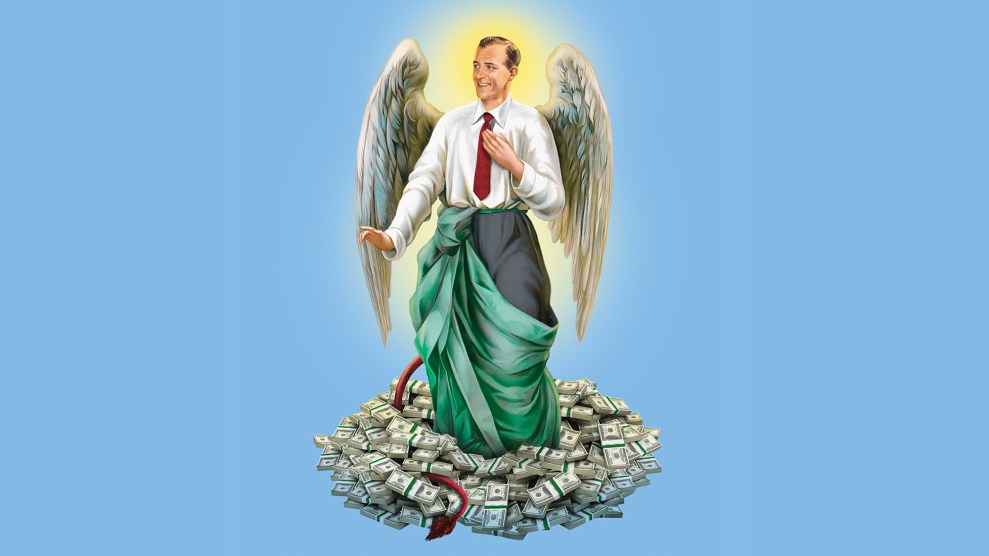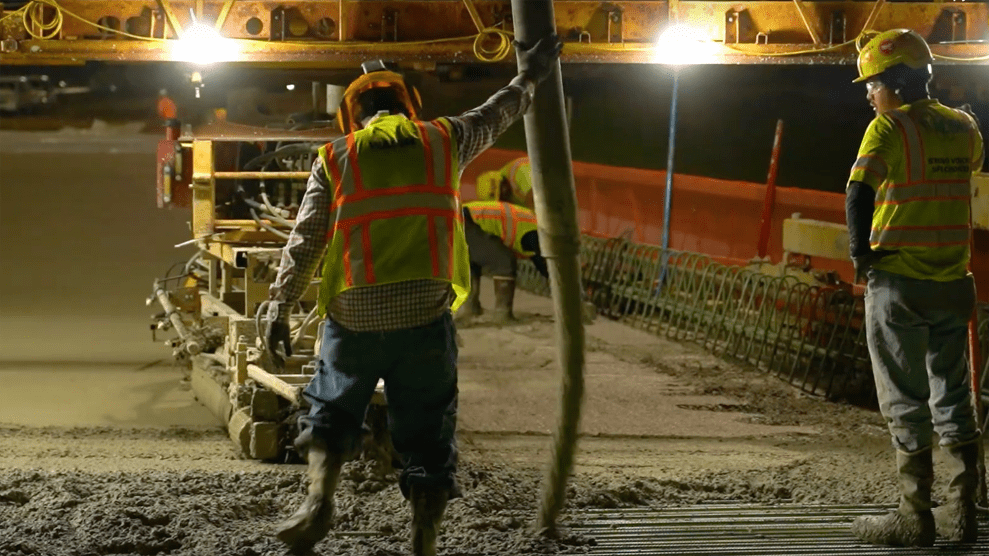
Mother Jones illustration; Jabin Botsford/The Washington Post/Getty
In the coming days, you will hear every imaginable take on why Americans voted to put Donald Trump back in office.
Pundits will say toxic masculinity was to blame—and men feeling usurped by women. They’ll say it was the Christian nationalism movement. A surprising shift in Latino voting patterns. Sexism. Racism. Transphobia. Elon Musk. Crypto bros. “Theo bros.” Housing prices. Gaza! Propaganda from Fox News and Newsmax. Misinformation on X.
Perhaps it was the cowardice of powerful men like Jeff Bezos and Jamie Dimon. The anti-immigrant frenzy—Trump’s incessant false claims about vicious murderers and rapists and mental patients swarming across the border like locusts. Property crime. Inflation. Interest rates. Lingering malaise from the pandemic. The Democrats’ failure to sell their economic wins. Kamala Harris’ inability to distance herself from an unpopular president.
Or maybe a combination of all these things. Gender and Gaza clearly made a difference. Inflation is a notorious regime killer—it was high inflation that underpinned the rise of fascism in Europe in the last century—and rising wages haven’t kept pace. When the Dems say, “Look, inflation is back to normal,” well, the price of groceries sure ain’t.
But I’m talking here about something even more basic, something that undergirds so much of America’s discontent. The best explanation, after all, is often the simplest:
Wealth inequality.
There is little that leaves people as pissed off and frustrated as the feeling that no matter how hard they work, they can’t ever seem to get ahead. And this feeling has been slowly festering since the 1980s, when Ronald Reagan and his cadre of supply-side economists launched the first salvos in what would become the great fucking-over of the American middle and working classes.
Half of the families in the richest nation on the planet have no wealth at all. Is it any wonder some of them are willing to see the system burn?
The frustration was evident in something two very different women in two very different states told me on the very same day in 2022 for a story on how America spends hundreds of billions of dollars a year subsidizing retirement plans mostly for rich people: “I’m going to have to work until I die.”
The great fucking-over commenced with President Reagan’s gutting of unions and the wealth-friendly tax cuts he signed into law in 1981 and 1986. The trend continued with George W. Bush’s tax cuts in 2001 and 2003, and culminated with the Trump tax cuts of 2017—which, like all of those other Republican initiatives, failed to generate the degreee of growth and prosperity the supply-siders promised. They did, however, make the rich richer as wages stagnated and the middle class shriveled.
We talk a lot about income inequality, but wealth and income are different beasts. Income is what pays your bills. Wealth is your security—and in that regard, most American families are just not feeling sufficiently secure.
In January 1981, when Reagan took office, the households of the Middle 40—that’s the 50th to 90th wealth percentiles—held a collective 31.5 percent of the nation’s wealth. Fast-forward to January 2022: Their share of the pie had dwindled to 25.7 percent, even as the combined wealth of the richest 0.01 percent of households soared from less than 3 percent of the total to 11 percent.
Put another way, 18,300 US households—a tiny fraction—now control more than a tenth of the nation’s wealth.
And what of the bottom 50 percent? How have they fared over the past four decades or so? When Reagan came in, their average household wealth was a paltry $944. (All figures are in 2023 dollars.) Today they have even less—just $659 on average, according to projections from Real Time Inequality, a site based on data from the Berkeley economists Emmanuel Saez and Gabriel Zucman. All told, those 92.2 million households now hold less than 0.05 percent of the nation’s wealth—which rounds down to zero. In short, half of the people living in the richest nation on the planet have no wealth at all.
They’re not doing so hot income-wise, either. In September, the Congressional Budget Office reported that average income of the highest-earning 1 percent of taxpayers in 2021 was more than $3.1 million, or 42 times the average income of households in the bottom 90 percent, according to the nonprofit Americans for Tax Fairness. That’s the most skewed income distribution since CBO began reporting this data in 1979, the group noted. Back then, the disparity was only 12 to 1.
And the billionaires? I’m glad you asked. Based on Forbes data, from January 1, 2018, when the Trump cuts took effect, to April 1 of this year, the nation’s 806 billionaires saw a 57 percent gain in their collective wealth—after adjusting for the inflation that has plagued working families.
Team Biden has actually done a good bit for the middle class, and tried to do more, but nuance is a hard sell when you’re pitching to families worried about whether they can make it to the end of the month.
“It’s a class and inequality story for sure,” Richard Reeves, the author of 2017’s Dream Hoarders, concurred when I ran my premise by him. “But it’s also a gendered class story.” (His latest book, Of Boys and Men, examines how “the social and economic world of men has been turned upside down.”) And he’s right.
But are you starting to see why the broader electorate, race and gender notwithstanding, might be just a little fed up?
I suppose, having also written a book about wealth in America, that I know enough to assert that wealth insecurity is fundamental.
But why, you might ask, would someone living on the edge vote for Republicans, whose wage-suppressing, union-busting, benefit-denying policies have only tended to make the poor and the middle class more miserable?
And why in the name of Heaven would they vote for Trump, a billionaire born with a silver spoon in his mouth who has lied and cheated his way through life? A man whose latest tax-cut plans—though some, like eliminating taxes on tips and Social Security income, can sound progressive—will be deeply regressive, giving ever more to the rich and rationalizing cuts that will hurt the poor and middle class and accelerate global climate chaos.
The reason, my friends, may well be that those on the losing end of our thriving economy don’t see it as thriving. Historically, every election cycle, when reporters fan out to ask low-income voters in swing states what they are thinking, the message has been roughly the same: Presidential candidates, Democrats and Republicans, come around here every four years and talk their talk, and then they leave and forget about us when it comes to policy.
Now that’s not entirely fair, because the Biden administration actually has done a good bit for working people and families of color, and has proposed all sorts of measures to make the tax code fairer and reduce the wealth gap (both the racial one and the general one)—including increasing taxes and IRS enforcement for the super-rich. But one can only get so far with a split Senate, Joe Manchin and Kyrsten Sinema on your team, and a rival party that would just as soon throw you into a lake of fire as support your initiatives.
And nuance is a hard sell when you’re pitching yourself to families worried about whether they can make it to the end of the month. Roughly half of the population barely gets by, has no stocks, no wealth, no retirement savings, and can’t imagine how they’ll ever afford a house—certainly not at current interest rates. Meanwhile, the billionaire techno-dicks are strutting around, publicly flexing their wealth and power with Democrats and Republicans alike.
In courting Americans who, fairly or not, feel like the system has never done them a bit of good, Team Trump has the rhetorical advantage, because he says he’ll destroy that system—even if that really just means he’ll subvert it to further enrich his buddies. “Populist Revolt Against Elite’s Vision of the U.S.” was one of the New York Times’ headlines after the race was called on Wednesday morning. And that’s absolutely right.
Because when the Republicans say, “The economy is a nightmare under Biden and Harris, and illegal immigrants are committing heinous crimes and taking your jobs and we’re gonna cut your taxes,” and the Dems counter, “Hey, none of that is really true and we actually did a lot and we feel your pain and the economy is going gangbusters and Trump’s tariffs will destroy it,” well, whom do you think a person struggling from paycheck to paycheck might be more inclined to believe?
Sure, the economy is doing great—if you own stock. If you have a well-paying job and a retirement plan. If you are in the top fifth of the wealth and income spectrums.
If not, even if you rightly suspect that the Republicans won’t do a damn thing to improve your lot, you might just be tempted to say, “Fuck it.”
And watch the system burn.

















